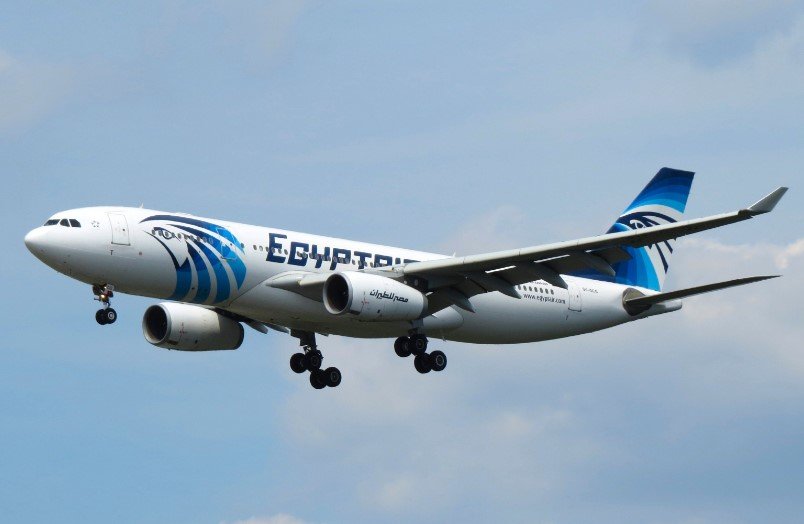The regional showdown between Israel and Iran is no longer confined to battlefields or diplomacy rooms. Now, it’s cleared passenger terminals too. EgyptAir has halted all flights to four major cities — Beirut, Amman, Baghdad, and Erbil — citing growing safety concerns tied to recent conflict spikes.
The decision, announced late Sunday, comes amid intensifying cross-border attacks and rising fears over airspace security. And while the Egyptian government hasn’t issued formal travel bans, the move speaks louder than a press release.
Safety First: EgyptAir Hits Pause on Regional Routes
EgyptAir’s message was short, direct, and unambiguous: the airline is suspending flights to Lebanon, Jordan, and Iraq until the situation on the ground — and in the air — cools down.
The official statement read: “Due to current events in the region and out of concern for the safety of its customers, EgyptAir announces the cancellation of its flights to Beirut, Amman, Baghdad, and Erbil airports until the situation in the region stabilizes.”
The timing is key here. The announcement landed just as the war rhetoric between Israel and Iran spilled over into more than just words. Skirmishes have escalated, with targeted missile strikes, drone shootdowns, and air defense systems lighting up Middle Eastern skies.
And with that, commercial flight routes suddenly looked less like business-as-usual corridors and more like potential crossfire zones.

What’s Actually Happening in the Skies?
This isn’t just about EgyptAir playing it safe. The airspace across parts of Lebanon, Syria, and Iraq has become a hazardous maze in recent days.
Commercial airliners, packed with passengers and jet fuel, can’t afford even the slightest risk of flying near military engagements.
Other airlines are reacting too:
-
Emirates, Turkish Airlines, and Qatar Airways have all rerouted or delayed flights in and out of affected zones.
-
Civil aviation authorities in multiple countries have issued advisories to avoid particular flight levels or corridors over active conflict zones.
-
Insurance premiums for aircraft flying across this belt have surged dramatically over the past 72 hours.
There’s a chain reaction here. And EgyptAir’s grounding is one of the more visible pieces.
Disrupted Routes, Disrupted Lives
Let’s not forget — these suspended flights aren’t just codes on departure boards. They’re business trips, family reunions, student plans, humanitarian travel, and freight lifelines.
EgyptAir’s suspended destinations aren’t obscure either. Beirut, Amman, Baghdad, and Erbil are major nodes for travel and commerce in the Arab world. Thousands use these routes daily — some for urgent reasons, others for routine travel. That’s all frozen now.
There’s a human cost to be reckoned with.
One Cairo-based logistics manager told Bloomberg-style reporters that the EgyptAir freeze has thrown supply lines into chaos: “We were moving medical devices into Erbil. Everything is now stuck at the warehouse. We’ve got no timeline for when we can ship.”
EgyptAir’s Role: More Than Just Another Airline
Founded in 1932, EgyptAir is one of the oldest airlines in the region — and easily the most recognized Egyptian brand internationally outside the tourism sector. The carrier has traditionally acted as a bridge across Arab capitals.
Here’s a quick look at its suspended routes:
| Destination | Country | Weekly Frequency (Approx.) | Strategic Significance |
|---|---|---|---|
| Beirut | Lebanon | 7 | Cultural, economic hub; major diaspora ties |
| Amman | Jordan | 10 | Diplomatic and trade ties with Egypt |
| Baghdad | Iraq | 5 | Infrastructure and business connections |
| Erbil | Iraq | 3 | Gateway to Northern Iraq, key logistics zone |
Each canceled flight isn’t just a delay. It’s a signal. EgyptAir’s decision reflects Cairo’s heightened concern that these routes — previously safe — may now fall within hostile proximity to Israel-Iran tensions.
Political Implications Just Under the Surface
The Egyptian government hasn’t issued a formal warning against travel to these countries. But it probably didn’t need to.
In Middle Eastern diplomacy, silence often shouts.
By allowing EgyptAir to suspend flights — without any contradictory signals from state media or official spokespeople — Cairo is implicitly saying: “We see the risks. We agree it’s serious.”
In fact, Egypt’s foreign minister, Dr. Badr Abdelatty, has been working the phones behind the scenes. Just this week, he reached out to Palestinian, Tunisian, and Czech counterparts to discuss how the Iran-Israel faceoff could spiral further — especially with Gaza already engulfed in humanitarian crisis.
So while EgyptAir’s press release stuck to the safety script, there’s a deeper diplomatic current at play. It’s Cairo moving its pieces cautiously, but visibly, on the regional chessboard.
And Now, the Wait
What happens next? Nobody knows exactly. EgyptAir hasn’t given a timeline for when flights might resume. Nor have regional air control authorities issued new maps for commercial aviation corridors.
But if history’s any guide, this won’t be a short-term hiccup.
The region’s past airspace disruptions — whether over Syria, Libya, or Lebanon — have lasted weeks, sometimes months. And with Israel openly vowing retaliation and Iran not backing down, the skies may stay dangerous for a while.
For now, passengers are left scrambling for alternate routes, while airlines keep watching radar maps and satellite feeds.
And EgyptAir? It’s keeping its wings folded — at least for these four destinations — until the political storm clears.
